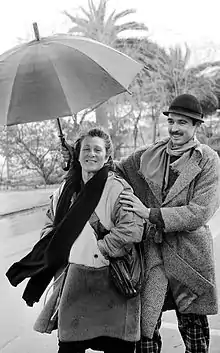Letizia Battaglia
Letizia Battaglia (Italian pronunciation: [leˈtittsja batˈtaʎʎa]; born 5 March 1935) is an Italian photographer and photojournalist.

Although her photos document a wide spectrum of Sicilian life, she is best known for her work on the Mafia.
Biography
Battaglia was born in Palermo, Sicily. Married at 16, she took up photojournalism after her divorce in 1971, while raising three daughters. She picked up a camera when she found that she could better sell her articles if they were accompanied by photographs and slowly discovered a passion for photography. In 1974, after a period in Milan during which she met her long-time partner Franco Zecchin, she returned to Sicily to work for the left-wing L'Ora newspaper in Palermo until it was forced to close in 1992.[1]
Battaglia took some 600,000 images as she covered the territory for the paper. She documented the ferocious internal war of the Mafia, and its assault on civil society. She sometimes found herself at the scene of four or five different murders in a single day. Battaglia and Zecchin produced many of the iconic images that have come to represent Sicily and the Mafia beyond Italy. She photographed the dead so often that she once said, "Suddenly, I had an archive of blood."[2]
Battaglia also became involved in women's and environmental issues. For several years she stopped taking pictures and officially entered the world of politics. From 1985 to 1991 she held a seat on the Palermo city council for the Green Party, from 1991 to 1996 she was a Deputy at the Sicilian Regional Assembly for The Network. She was instrumental in saving and reviving the historic center of Palermo. For a time she ran a publishing house, Edizioni della Battaglia, and co-founded a monthly journal for women, Mezzocielo. She is involved in working for the rights of women and, most recently, prisoners.
In 1993, when prosecutors in Palermo indicted Giulio Andreotti, who had been prime minister of Italy seven times, the police searched Battaglia's archives and found two 1979 photographs of Andreotti with an important Mafioso, Nino Salvo, he had denied knowing. Aside from the accounts of turncoats, these pictures were the only physical evidence of this powerful politician's connections to the Sicilian Mafia. Battaglia herself had forgotten having taken the photograph. Its potential significance was apparent only 15 years after it was taken.[1][2]
In 1985 she received the W. Eugene Smith Grant in Humanistic Photography.[3] In 1999 she received the Photography Lifetime Achievement of the Mother Jones International Fund for Documentary Photography.[4] In 2007 she received the Dr. Erich Salomon Award, a 'lifetime achievement' award of the German Society for Photography (DGPh).[5][6] In 2009, she was given the Cornell Capa Infinity Award by the International Center of Photography.[7]
In 2005, she appeared in the documentary Excellent Cadavers based on the 1995 book by Alexander Stille. Battaglia plays the role of survivor and passionate eyewitness.[8] Battaglia has a cameo appearance in the 2008 Wim Wenders film Palermo Shooting as a photographer.
A documentary film based on her life, Shooting the Mafia, was released in 2019.[9]
Exhibitions
- Letizia Battaglia. Just For Passion, MAXXI - National Museum of the 21st Century Arts, Rome, 2016[10]
- Siciliana, Bel Vedere Fotografia, Milan, Italy[11]
- Bildmaterial der Dr.-Erich-Salomon-Preisträgerin 2007 Letizia Battaglia[12]
- Dovere di Cronaca, Festival Internazionale di Roma, April–May 2006[13]
- Una vita per la Mafia, Orvieto Photography festival, Palazzo dei Sette, Italy, 2009[14]
- Letizia Battaglia: Breaking The Code Of Silence, Open Eye Gallery, Liverpool, UK, 2014[15]
- Cantieri Culturali alla Zisa, Palermo, Sicily, 2016[16]
Books
- Passion, Justice, Freedom – Photographs of Sicily. Gordonsville, VA: Aperture, 2003. ISBN 0-89381-888-7.
- Dovere di Cronaca - The Duty to Report., Rome: Peliti Associati, 2006. With Franco Zecchin. ISBN 88-89412-26-7.
- Just For Passion. Drago, 2016. ISBN 978-8898565207.
- Anthology. Drago, 2016. ISBN 978-8898565191.
Documentaries
- Battaglia (2004) – by Daniela Zanzotto
- Shooting the Mafia (2019) – documentary film directed by Kim Longinotto and produced by Niamh Fagan
References
- Letizia Battaglia: Her photographs awakened awareness of the Sicilian Mafia, by Alexander Stille, Courage, Media Studies Journal, Volume 14, Number 2, Spring/Summer 2000
- Testimony of a Keen Witness To Sicily's Enduring Sorrow, The New York Times, December 16, 2001
- "1999 Life Time Achievement". Archived from the original on September 2, 2007.
- (in German) Salomon-Preis für Letizia Battaglia, Fokussiert, September 5, 2007
- (in German) Press release, Deutschen Gesellschaft für Photographie, August 2007
- "2009 Infinity Award: Cornell Capa Award". International Center of Photography. 23 February 2016. Retrieved 2019-03-07.
- 'Excellent Cadavers,' an Italian Documentary, Dissects the Mafia, The New York Times Movie Review, July 12, 2006
- Lodge, Guy (February 6, 2019). "Sundance Film Review: 'Shooting the Mafia'".
- "Letizia Battaglia. Just For Passion". Maxxi.art. 21 September 2016. Retrieved 11 January 2019.
- "Mytech - News - In mostra Letizia Battaglia". 14 December 2007. Archived from the original on 14 December 2007. Retrieved 11 January 2019.
- "Bildmaterial der Dr.-Erich-Salomon-Preisträgerin 2007 Letizia Battaglia". 12 November 2007. Archived from the original on 12 November 2007. Retrieved 11 January 2019.
- "Letizia Battaglia, la fotografa della mafia in mostra a Orvieto - Galleria - Repubblica.it". Repubblica.it. Retrieved 11 January 2019.
- "Letizia Battaglia: Breaking The Code Of Silence". Open Eye Gallery. Retrieved 11 January 2019.
- Maida, Desirée (6 March 2016). "Buon compleanno Letizia Battaglia. Palermo omaggia la "sua" fotografa con una grande retrospettiva ai Cantieri Culturali alla Zisa: ecco le immagini dall'opening". Artribune.com. Retrieved 11 January 2019.
External links
- www.letiziabattaglia.com
- Testimony of a Keen Witness To Sicily's Enduring Sorrow, The New York Times, December 16, 2001
